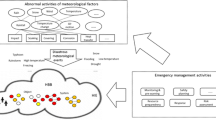Abstract
In this paper, the multi-dimensional scenario space method (MDSS) is applied in case study of earthquake, and a modified MDSS is developed. For complex disasters such as earthquake, one “space” is not enough to describe the disaster, and a multi-level multi-dimensional scenario space method (MLDSS) is developed. With MLDSS, a certain scenario may comprise several sub-spaces each representing an element object in the disaster. Thus, a “case-scenario-element” model with MLDSS is developed for case study taking earthquake as example. Ontology method is applied in developing the case model. Detail scenario data and information may be collected both from documents materials and the website searching. Scenarios deduction process with MLDSS is provided in this paper, and two types of scenarios evolution processes are discussed: one is single scenario process and the other is multi-scenarios process. Brief view of scenarios’ evolution and the reasoning relationship are given as results, which may provide reference and recommendation to decision-making support in emergency responses.
Access this chapter
Tax calculation will be finalised at checkout
Purchases are for personal use only
Similar content being viewed by others

References
Schank, R.C.: Dynamic Memory: A Theory of Reminding and Learning in Computers and People. Cambridge University Press, Cambridge (1982)
Ke, J.: Emergency rescue & T. based on the overall dominance reasoning case decision. Syst. Eng. 26(9), 15–20 (2008)
Endsley, M.R.: Situation awareness in aviation systems. In: Garland, D.J., Wise, J.A., Hopkin, V.D. (eds.) Handbook of Aviation Human Factors, pp. 257–276. Erlbaum, Mahwah (1999)
Hui, J.: Scenario and relationship expression in real-time emergency response. Univ. Electron. Sci. Technol. (Soc. Sci. Edn.) 01, 48–52 (2012)
Wu, G., Chuan, Z.: Jiang million square decision model. City scene of major accidents and the trend deduced reproduction of Southeast University. Philos. Soc. Sci. 13(1) (2011)
Hristidis, V., Chen, S.C., Li, T., Luis, S., Deng, Y.: Survey of data management and analysis in disaster situations. J. Syst. Softw. 83(10), 1701–1714 (2010)
Gruber, T.R.: Toward principles for the design of ontologies used for knowledge sharing. Int. J. Human-Comput. Stud. 43(5–6), 907–928 (1995)
Klien, E., Lutz, M., Kuhn, W.: Ontology-based discovery of geographic information services - an application in disaster management. Comput. Environ. Urban Syst. 30(1), 102–123 (2006)
Halliday, Q.: Disaster Management, Ontology and the Semantic Web (2007). http://polaris.gseis.ucla.edu/qhallida/DisasterManagementFinal.html, UCLA
Klann, M.: Tactical navigation support for firefighters: the LifeNet ad-hoc sensor-network and wearable system. In: Löffler, J., Klann, M. (eds.) Mobile Response. LNCS, vol. 5424, pp. 41–56. Springer, Heidelberg (2009)
Xu, M., Duan, L.-Y., Xu, C.-S., Tian, Q.: A fusion scheme of visual and auditory modalities for event detection in sports video. In: Proceedings of the 2003 International Conference on Multimedia and Expo, pp. 333–336 (2003)
Liu, Y., Feng, Y., Zhang, H., Yang, R., Zheng, L.: Study on multi-dimensional scenario-space method for case-based reasoning. In: The 10th International Conference on Cybernetics and Information Technologies, Systems and Applications, Orlando, FL, USA, 9–12 July 2013
Acknowledgement
This work was partially supported by the National Natural Science Foundation of China (No. 91324022, No. 91224008, No. 91024032, No. 70601015, No. 70833003).
Author information
Authors and Affiliations
Corresponding author
Editor information
Editors and Affiliations
Rights and permissions
Copyright information
© 2014 Springer International Publishing Switzerland
About this paper
Cite this paper
Qian, J., Liu, Y., Wang, G., Yang, N., Zhang, H. (2014). A Cross-Reasoning Method for Scenario Awareness and Decision-Making Support in Earthquake Emergency Response. In: Chen, Y., et al. Web-Age Information Management. WAIM 2014. Lecture Notes in Computer Science(), vol 8597. Springer, Cham. https://doi.org/10.1007/978-3-319-11538-2_11
Download citation
DOI: https://doi.org/10.1007/978-3-319-11538-2_11
Published:
Publisher Name: Springer, Cham
Print ISBN: 978-3-319-11537-5
Online ISBN: 978-3-319-11538-2
eBook Packages: Computer ScienceComputer Science (R0)



